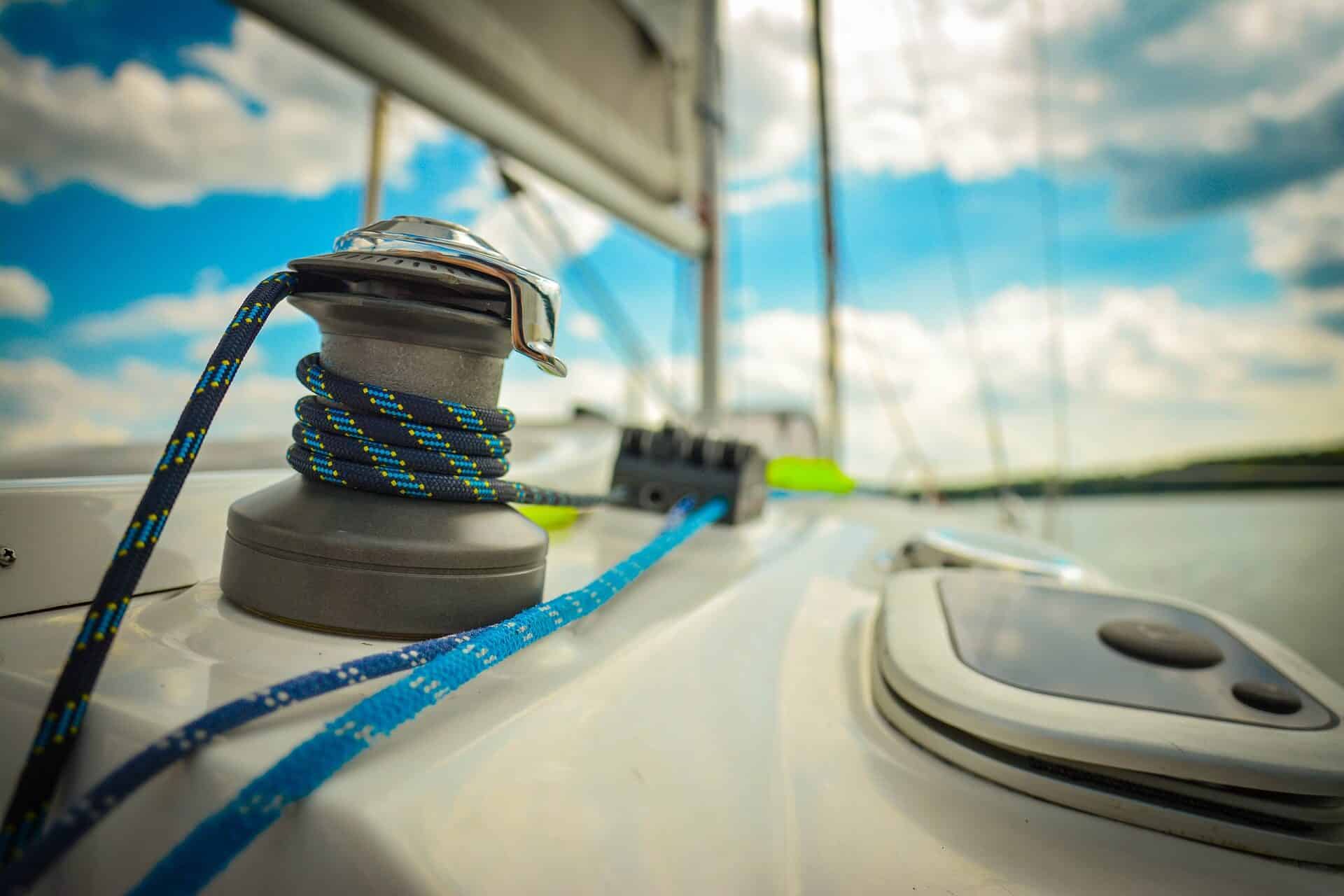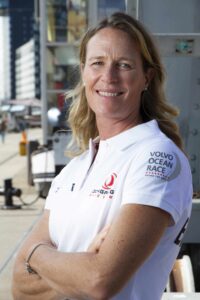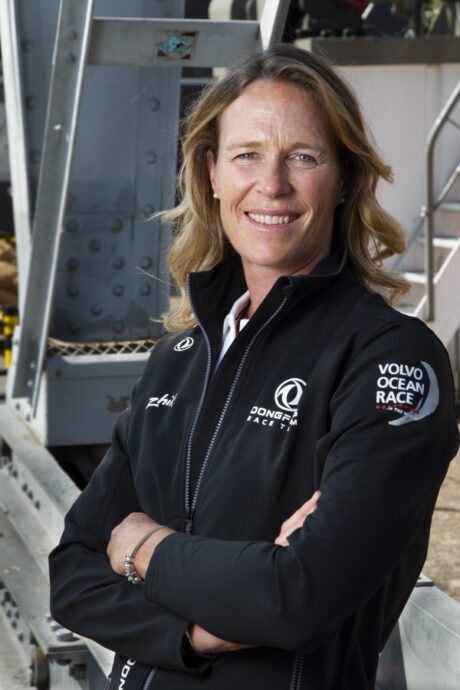

World Sailing Award winner needs challenges to excel
Take on challenges, persevere and always have a clear goal in mind.

Carolijn Brouwer
Winner Volvo Ocean Race 2018Carolijn Brouwer has achieved many successes after winning the youth World Championships in 1991 and the World Sailing Championships in 1993. In 2018, she won the 2017-2018 edition of the 9-month prestigious and exhausting Volvo Ocean Race with the mixed Chinese-French Dongfeng Race Team. That has earned her two prizes. Carolijn and her French colleague Marie Riou – the first women to have won the competition – were named Sailor of the Year at the World Sailing Awards ceremony in Florida on October 31, 2018. A week later, Carolijn received, for the second time, the Conny van Rietschoten Trophy from the Watersportverbond for her ‘remarkable performance in sailing’.
Her recipe: take on challenges, persevere and always have a clear goal in mind. Actually the same ingredients companies need to become and remain successful. Her lectures are therefore interesting for both sports and sailing enthusiasts and entrepreneurs.
She has participated in the Volvo Ocean Race three times. Yet Carolijn Brouwer does not know whether she will board for the fourth time in 2020-2021. “The last time my goal was to win. That worked out, but if Charles Caudrelier, the French skipper of the Dongfeng Race Team, calls me tomorrow and asks if I am interested in winning again, I won’t do anything. We’ve already won, so that’s no longer the challenge I’m looking for. I always need to sink my teeth into something new. Two Dutch boats participated in the last race. I was on a Chinese-French ship. Therefore, it would be great fun to be a member of a Dutch team next time and to play a bigger role in it.”
“Winning was not our goal, it was not realistic.”
Whether she will participate in the 2020 Olympics in Tokyo in the meantime is not yet clear to her. It takes up to three years to physically recover from participating in all stages of a Volvo Ocean Race. You actually have to rebuild all your muscles. In addition, her husband, Darren Dunbock, is coach of the Australian Olympic team. “That would mean that we both are away from home before and during that period, which I am sure our son would not like one bit.”
While cars race at 80 miles an hour underneath the bridge restaurant over the A4 motorway near Aalsmeer, Carolijn talks about her first Volvo Ocean Race (2001-2001). As a helmsperson, she and her team came seventh. “Participating was a dream come true. I got the chance to realise my passion. It was fantastic, even though I had never done it before and only sailed the two southern stages of this race. Afterwards I had a strong desire to experience the race to the full, but in the then man-dominated sailing world it took another twelve years before I finally got that chance. In 2014-2015, I participated in Team SCA of a Swedish company in hygiene products. Eighty percent of that company’s customers are women, so SCA wanted a women’s team. We got all the necessary facilities and support from coaches and mentors.
Winning was not our goal, it was not realistic. Despite hard work and lengthy preparation, we couldn’t completely close the gap in experience, we just hadn’t experienced enough together. Our goal was to put and keep women’s ocean sailing and racing on the world map, creating momentum and continuity. We even won a stage, did well during the harbour races and finally reached sixth place. Not surprising when you consider that we had to compete as a women’s boat against seven men’s boats.”
Winning is realistic
When Charles Caudrelier asks her to join a mixed team in the 2017-2018 race, the goal of winning is realistic. “During my second race the Dongfeng Race Team was still our opponent. The Chinese crew then mainly learned the tricks of offshore sailing, and became third. This time there are, besides Carolijn, French, Chinese, two New Zealanders and one Australian on board. The language of communication is English, but the Chinese have learned English from the French, which gives Carolijn a second role as an interpreter. No problem. She speaks six languages, and her French has improved a lot after a year and a half of living and working between French people. Everyone is multifunctional on a boat like this, but also has a specific role.
“You must love adventure, being outdoors, sailing, and the elements of nature.”
I steered and helped out with other things, but was mainly a headsail trimmer and had to communicate intensively with the mainsail trimmer, the helmsman. We were very much driven by the feeling of how we could get as much speed of possible out of the boat at any circumstances. Of course we had to rotate, because nobody can be active 24/7″, says Carolijn. “On a stage start, when we first had to cover a few miles to get back to sea from a bay, but also during harbour races during a stop-over, we were all placed in our specific roles and positions. On the way we alternated. The navigator had to map out the fastest routes from a to b. We stood on deck, looked around and passed on what we saw.”
Tough
Even though each stage lasts twenty days and the sailors can then recover for a few days during a stop-over on land, these nine months are really tough.”During lectures I show a video about how heavy, rough and difficult things are on board. Then I see people thinking ‘what’s fun about that?’The Volvo Ocean Race is one of the biggest sailing events, besides the Olympic Games and the America’s Cup, and at the same time the most exhausting. You must love adventure, being outdoors, sailing, and the elements of nature. It is almost impossible to prepare for this physical and mental war with yourself. You can’t do much more than train, prevent injuries and make sure you’re strong and fit. The first half of the race everyone is not too bad. The last four months it is much harder to stay motivated and fit.
At that moment in time, after five months, you will have eaten a lot of freeze-dried food, astronaut food, made edible with boiling water. Three meals of a 1,000 calories a day, as well as nuts, powerbars, and many vitamin and mineral pills. In total, that is 5,000 calories, twice the normal intake. You have to, because you need much more energy to recover from hardship and sleep deprivation. During stop-overs you go loose and eventually you don’t think of burgers, pizzas and beer, but long for fresh fruit and vegetables. You can go to a restaurant, but one of our own cooks travelled to every stop-over to prepare very healthy and nutricious meals for us. What choice would you make?”
Teamwork and communication
Carolijn tells her audience that teamwork and communication are always key issues and in that respect sailing is a good metaphor for the business community. “Olympic sailing is actually my background. You will work intensively towards the Games for four years. You train every day, take a hot shower, eat a good meal, go to the physiotherapist or masseur if necessary and then enjoy a restorative sleep for eight or ten hours. During the Volvo Ocean Race we do not get the chance to recover, but still we continue doing what we feel we have to do. The battle against exhaustion is a challenge. That’s partly why you keep on doing it. You want to see how far your body and mind can be pushed, before you drop, and get the best out of yourself and people around you by working together in a team. That is the most important thing. Sailing around the world on my own, like Laura Dekker did at the time, doesn’t do anything for me.
I would rather prefer to sail all the stages of the race, together with my team. During the ocean race you are allowed to skip a stage, but that’s not an option for me. It’s all or nothing, like it is in the corporate world, where you can only beat competitors if you have a clear goal as a business team, and all noses are pointing in the same direction. All activities must be at the service of the goal and competition motivates that. Sometimes this leads to exciting situations, such as during this year’s race.
“Teamwork and communication are always key issues.”
We started the last 970 miles stage from Gothenburg (Sweden) to The Hague with a delay. Three boats had the same score. Unlike our competitors, we sailed along the coast to our final destination. Three miles from the finish line, after 45,000 miles of sailing, we saw our opponents without having to use binoculars, which was unprecedented. So we pushed even harder, while pressure was building up. That’s why we won the race. A beautiful metaphor, which makes it possible to draw parallels with the corporate world. People on board, like staff and colleagues, eventually became almost family members, all striving for the same thing. A sailing trip like this is an emotional roller coaster with highs and lows. Once in a while you literally fall, then you get up again, with the help of your fellow sailors
“You are there for each other.”
Support is also very important. Carolijn: “There were nine of us on board, but we would not have been able to make it without a technical support team that waited for us at every stop-over, took over the boat and within six days checked everything, and carried out all necessary repairs
Sailing beats hockey
Sailing has not always been Carolijn’s great passion. “I started when I was 10, but in the weekends all the fun things usually coincided, and it was difficult to choose between sailing or going to the movies with friends. I wanted to experience everything. In Brazil, where we lived at that time, we learned to sail. Back in the Netherlands I studied at the Rijnland Lyceum in Oegstgeest at the age of 13 and my mother gave me a hockey stick. She told me that people did not sail in the Netherlands, because the winters were too cold. After a couple of weeks, I saw young teenagers who were sailing in small, so-called Optimist boats, during their winter training. Two weeks later, I was sailing in a boat like that, not in a bikini and a T-shirt, like in Brazil, but wearing a dry suit. My parents recognised my enthusiasm, and gave me a boat. Slowly the results came and I finally became passionate about sailing.”
After winning the Youth World Cup in a Laser Radial – a few months after her school exams – she notices that you get something in return if you work hard, persevere and do not give up. Sailing becomes her life. Carolijn Brouwer decides to go to Portugal to study Portuguese for advanced students, at least when it the weather is bad. Otherwise, she would take the train to Cascais, Europe’s western point, to sail at sea with Portuguese fruienbds. “After a year I returned and studied Latin American languages and cultures in Leiden. Brazil had stolen my heart, and this was a good way to stay connected. It took me 5.5 instead of 3 years to graduate, but that was because I sailed on the ocean too much during my internship there.
In the Netherlands she finds it super to sail on the IJsselmeer and the many lakes, but notes that nowadays sailors opt for the sea more frequently. If you have to train for the Olympic Games you need to train at sea. ” Why does she like sailing so much? No day is the same, whether you’re sailing on a lake, the IJsselmeer or the ocean. Sailing is a complex sport and depends on many different factors.
“I’ve never sailed a perfect race in my life. Maybe I’ll get close, but there’s always something you can do even better.”
As a result, sailing continues to offer the challenges that Carolijn needs to be able to continue and excel for many years to come. “I am 45 years old. They shouldn’t put me on the foredeck during ocean races, for which you need to be very strong and fit, but I’m very good at steering and trimming in the back. Experience counts at those positions and that is important in this sport.”

Carolijn Brouwer
Winner Volvo Ocean Race 2018Carolijn Brouwer is the first female winner of the Volvo Ocean Race. She is a top sailor in a man's ...
Request quote View profile
